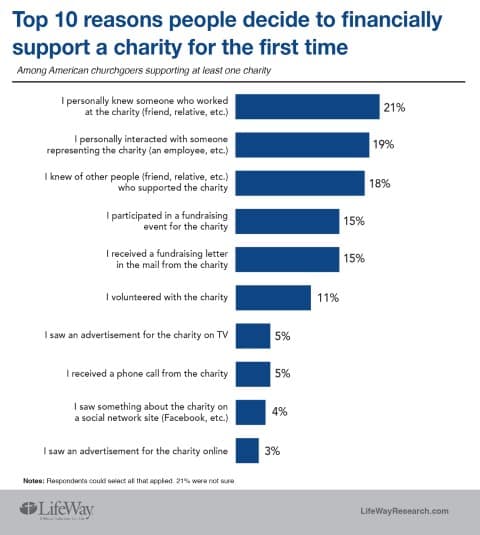NASHVILLE (BP) — When it comes to charity, a personal touch works 10 times better than Facebook — at least for churchgoers, according to a study released April 17.
A new report from LifeWay Research found more than half of Protestant churchgoers say a personal connection inspired them to give money to a charity for the first time. The evangelical research firm conducted the survey this past Aug. 22–30.
Social media such as Facebook inspired only 4 percent of similar donations.
 Three-quarters of churchgoers support at least one charity besides their church. According to the survey, nearly half do volunteer work, while a similar number have made changes to the charities they support.
Three-quarters of churchgoers support at least one charity besides their church. According to the survey, nearly half do volunteer work, while a similar number have made changes to the charities they support.
Churchgoers like to give — and to get involved, said Scott McConnell, executive director of LifeWay Research.
“The question is, where will churchgoers give this year? The answer lies in having a personal connection,” McConnell said. “It turns out charity really does start close to home.”
Charitable giving
The nationally representative study asked adults who attend a Protestant church at least once a month to look at their charitable giving from 2016.
Sixty percent of those churchgoers gave to the same number of charities in 2016 as they did the previous year. Fifteen percent gave to more charities. Eight percent gave to fewer, while 15 percent were not sure.
Among those who donated to charities, 49 percent made changes in which charities they supported in 2016. This included about a third (31 percent) who gave to a charity they’d never supported before.
“The reality is that funding for charities is anything but stable,” McConnell said. “When a donor adds a charity, it can take away from ministries they have supported in the past.”
When asked what factor most prompted them to give, 21 percent say they knew someone who worked there. Nineteen percent had met someone from the charity, while 18 percent say friends of theirs supported the charity.
Fifteen percent had been to a fundraiser, while 15 percent had received a letter from the charity. Eleven percent had volunteered for the charity.
Phone calls (5 percent), television ads (5 percent), social network sites such as Facebook (4 percent), online ads (3 percent) and email appeals (2 percent) were less influential.
Most donors support a few charities
LifeWay Research also asked churchgoers how many charities they gave to last year, aside from their local congregation. Those charities could be religious or non-religious. The donations could not be property or volunteer time.
Seventy-three percent of churchgoers gave to at least one charity beyond their church.
This includes 15 percent who gave to one additional charity and 58 percent who gave to multiple charities. About a third (34 percent) gave to two or three additional charities. Nineteen percent gave to between four and seven charities. About 6 percent gave to eight or more additional charities.
About a quarter (27 percent) gave to no additional charities.
Churchgoers from Assemblies of God and other Pentecostal backgrounds are most likely to give only to their church (38 percent). Nondenominational Christians (30 percent) and Baptists (29 percent) were more likely to give only to their church than Lutherans (14 percent).
Lutherans (29 percent) are more likely to give to five or more charities than Baptist (13 percent), nondenominational (12 percent) or Assemblies of God/Pentecostal churchgoers (10 percent).
About half (48 percent) of churchgoers say they volunteer at a charity — including their church. Forty-four percent don’t volunteer. Eight percent aren’t sure.
Those who go to church at least once a week (51 percent) are more likely to say they volunteer than those who attend once or twice a month (30 percent). More than half of Methodist (63 percent), Lutheran (55 percent) and nondenominational churchgoers (53 percent) volunteer. Baptists (38 percent) are less likely.
“Donors come and go frequently,” McConnell said. “It helps to know why they give in the first place — typically a personal connection to the ministry or charity.”
For more information on this study, visit LifeWayResearch.com or view the complete survey report PDF.
Methodology
LifeWay Research conducted the study Aug. 22–30, 2017. The survey was conducted using the web-enabled KnowledgePanel, a probability-based panel designed to be representative of the U.S. population.
Initially, participants are chosen scientifically by a random selection of telephone numbers and residential addresses. Persons in selected households are then invited by telephone or by mail to participate in the web-enabled KnowledgePanel. For those who agree to participate, but do not already have internet access, GfK provides at no cost a laptop and ISP connection.
For this survey, a nationally representative sample of U.S. Protestant and nondenominational adults (18 and older) who attend religious services once a month or more often was selected from the KnowledgePanel.
Sample stratification and base weights were used for gender, age, race/ethnicity, region, metro/non-metro, home ownership, education and income to reflect the most recent U.S. Census data. Study-specific weights included for gender by age, race/ethnicity, region and education to reflect GSS 2016 data. The completed sample is 1,010 surveys. The sample provides 95 percent confidence that the sampling error does not exceed plus or minus 3.1 percentage points. Margins of error are higher in subgroups.


